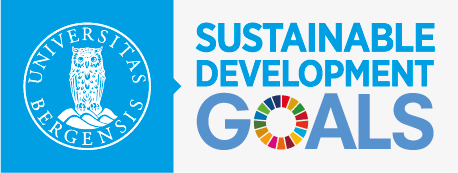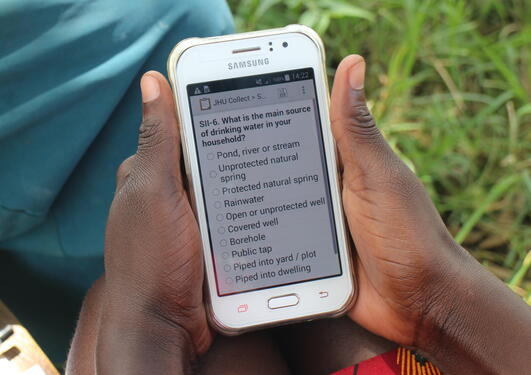UiB sweeps NORHED II funding
14 projects from the University of Bergen have received funding for a total value of 290 million Norwegian kroner from the NORHED II programme.

Main content
NORHED is Norway’s national flagship programme on higher education and research for development. NORHED II represents the second time the Norwegian Agency for Development Cooperation (Norad) awards funding through the programme. A total of 1.1 billion Norwegian kroner (NOK) were awarded to a total of 60 projects out of 199 applications, of which NOK 290 million were awarded to 14 University of Bergen (UiB) projects. This puts UiB top among Norway’s universities for NORHED II funding.
The aim of the NORHED programme is to strengthen the capacity of higher education institutions in the global south to produce higher-quality graduates, more research, higher quality research, and more inclusive higher education. The programme is based on a collaborative partnership model between higher education institutions in Norway and the global south.
“Strengthening the capacity of higher education institutions is important in order to strengthen their role as social actors for developments,” says Norad’s Director General Bård Vegar Solhjell.
- In April 2020, Norway's Ministry of Foreign Affairs funded a new Pacific PhD programme on ocean and climate for the Pacific, N-POC. This was a special funding ahead of the rest of announcement of the NORHED II call. This is a collaboration between the University of Bergen and the University of the South Pacific. Read more about N-POC here.
In this article, we briefly present the UiB projects receiving NORHED II funding.
Mathematics for sustainable development
Professor Guttorm Alendal from the Department of Mathematics explains the basics of the project Mathematics for sustainable development.
The project digested
Mathematics is the language in which God has written the universe”, is a quote by Galileo Galilei in the 17th century. In the centuries that followed, humanities have seen a tremendous scientific development, leading to the industrial revolution, and more recently the digital revolution. During this development mathematics has evolved and confirmed its role as the language of the sciences.
In a progress report on UN’s 2030 agenda UN states that, among others, there is a need to harness science, technology and innovation with a greater focus on sustainable development. To achieve this the need for mathematical literacy becomes even more important, this is also mentioned explicitly in SDG 4.
Project’s particular importance
In 2015, UN estimated that more than half a billion children in schools were not achieving wanted proficiency in reading and mathematics. The problem being most profound in developing countries, and these countries have maybe the largest challenges. Globally there has been little progress in the percentage of primary school teachers who are trained, around 64 per cent in sub-Saharan Africa.
Project goals
The overall aim is to increase the mathematical literacy in Tanzania and Uganda. Three outcomes are defined: Better mathematical research at the two African universities, updated and relevant educational programmes in mathematics and mathematical education, and higher visibility of the departments.
The project will execute a research programme, in collaboration with colleagues within health and medical institutions in the three cities, focusing on the ongoing COVID-19 pandemic. A cohort of PhD candidates will be hired, and this research will make also assist in renewing the educational programmes, increase the visibility of the departments, and increase the academic staff’s ability to attract and execute future projects, beyond health topics.
Relevant SDGs in project
Overall the project addresses several of the SDGs such as Goal 3 of Good Health and Well-Being, Goal 4 of Quality Education, Goal 5 of Gender Equality and Goal 13 of Climate Action.
Partner institutions
University of Dar es Salaam, Makerere University, University of Bergen
SAFEWORKERS
Professor Bente Elisabeth Moen, who is Director at the Centre for International Health and Director of the University of Bergen focus area Global Challenges, explains the project SAFEWORKERS – Safe Work Conditions by Innovative Research and Education.
The project digested
SAFEWORKER aims to improve safety and health for workers in Sub-Saharan Africa (SSA) through novel and expanded Occupational Health (OH) capacity development in higher education and research. We will support capacity building in Tanzania and Ethiopia within occupation.
Project’s particular importance
Very few universities in SSA have education in occupational health. Industrial activities increase in SSA, but there are minor understanding of work environment and health, and the workers need protection. We must educate educators to make sure the countries develop knowledge in occupational health.
Project goals
We will support education in occupational health in several countries in SSA. We will establish a Virtual School on Occupational Health in SSA, run from Tanzania and Ethiopia, in cooperation with the University of Bergen.
Relevant SDGs in project
The most important SDG for this project is SDG sub goal 8.8, which states: “Protect labour rights and promote safe and secure working environments for all workers”, and then we have SDG 3 – “Ensure healthy lives and promote well-being for all at all ages”. It will also influence SDG4 Quality education for all and SDG 5 Gender equality and SDG 17 Partnerships for the Goals.
Partner institutions
Addis Ababa University, Muhimbili University of Health and Allied Sciences, University of Bergen
Refugees on the Move
Professor Leif Manger from the Department of Social Anthropology talks us through the essence of the project Refugees on the Move – South Sudanese in Ethiopia, Sudan and Uganda.
The project digested
The project focuses on the current flight of people away from the collapsing new nation state of South Sudan into the three neighbouring states of Uganda, Ethiopia and Sudan.
Spatially the focus is a regional one, looking at the total flow of refugees, from the problems forcing them to leave South Sudan and the flight into the three neighbouring countries where they often end up in camps in border areas or in various urban centres.
Comparatively a shared focus will be developed on the processes of internal differentiation among the refugees. It is well known that women and children make up a majority, also in the camps, making gender, and also health and education important issues. But class is also important, with the poorest groups ending up in refugee camps totally dependent on available aid, and more affluent groups ending up in cities in which they might live on resources invested earlier.
The concept of “assemblages” will be developed to capture the complexity of factors affecting the refugees. Such factors vary from the causes for the flight itself and the assets of the individual refugees, to the arrival in the neighbouring countries, each with different policies and legal contexts for receiving and dealing with refugees, making refugee governance important. Differences in the international focus and ability to assist also varies, with institutions such as the UN Refugee Agency (UNHCR) and UN Migration (IOM) and various international and local non-governmental organisations (NGOs) trying to deal with the effects of such differences. By looking at refugee movement across countries in the region the project is the first academic effort to systematically build a wider regional understanding of opportunities and constraints defining the life worlds of the refugees.
Project’s particular importance
We propose these studies in the belief that there is a lack of regional perspectives and of effective regional cooperation on the problem of South Sudanese refugees. What we suggest then is to carry out the first in-depth, comparative academic study on South Sudanese refugees which we believe will contribute to the creation of a knowledge-based regional perspective on South Sudanese refuges and eventually has the potential of contributing to a better policy environment and improved institutionally based strategies for tackling the problem of South Sudanese refugees in the region.
Project goals
Strengthen research and teaching capacity at East African universities on refugees and the movement of refugees between the collaborating countries. Use such academic competence and experience to engage with various stakeholders to promote better understanding and interaction between refugees coming from local communities and internally displaced people (IDP) camps in their meetings with governmental and non-governmental institutions on global, regional, national and local levels. Thus, improve the contribution of academic institutions in participating countries to both knowledge production and policy oriented processes with the aim of amplifying the voices of refugees and help them be heard by policy and decision makers.
Relevant SDGs in project
Broadly speaking, this project falls within SDG 4 on quality education. While the SDGs do not include specific targets on refugees and IDPs they do acknowledge displaced people as a vulnerable group in need of particular attention. The SDGs also recognize the factors that risk jeopardizing progress, including global health threats, more frequent and intense natural disasters, spiralling conflict, humanitarian crises and forced displacement itself. Thus, the project relates to several SDGs. For instance, refugees are the product of poverty; hence they fall within SDG 1, SDG 5 in the sense that there is gender dimension in the refugee problem with the need to empower women refugees. Since there are millions of refugees in cities, the project also falls within SDG 11, and cities need to be inclusive and sustainable. At the present time and in many countries in the region, only those refugees who are in designated camps are recognized. Those who are in cities are not recognized and as such are vulnerable to abuse by security services and police, and their rights are violated with impunity. Finally, the project also falls within SDG 16 that promotes peaceful and inclusive societies for sustainable development, provides access to justice for all and build effective accountable and inclusive institutions at all levels.
Partner institutions
Addis Ababa University, University of Juba, University of Khartoum, Makerere University, University of Bergen
CO2-EOR for CCUS in Colombia and Ecuador
Researcher Bergit Brattekås from the Department of Physics and Technology gives us the lowdown on the project CO2-EOR for CCUS in Colombia and Ecuador: Norwegian energy initiative.
The project digested
The Paris agreement and UN sustainability goals can only be achieved by permanently storing CO2 in geological formations. Significant global efforts are necessary to accelerate widespread implementation of CO2 storage, which has been restricted by the high cost: most importantly because it has not been resolved how and by whom the costs will be covered. A scenario where taxpayers or end-users pay the bill may be applicable in the western, well-developed world but is unlikely to work in most parts of the world; especially not in developing countries where access to affordable energy is a concern and fossil fuel will continue to provide essential energy during the next decades. By utilizing anthropogenic CO2 for enhanced oil recovery (EOR) with simultaneous CO2 storage, the carbon footprint in oil production is reduced. CO2-EOR is currently the only process that may store sufficient CO2 volumes to mitigate climate change while generating a revenue for the industry; a critical criterium for widespread implementation of Carbon Capture, Utilization and Storage (CCUS). We present a North-South-South initiative, where knowledge gained in Norwegian CCUS lab to field research (University of Bergen) is transferred to higher educational institutions in Colombia (Universidad Nacional de Colombia) and Ecuador (The Escuela Superior Politecnica del Litoral (ESPOL)). The main objective of the collaboration is to educate the next generation of petroleum engineers: energy engineers, who will have the entire value chain of CCUS integrated in their education. The 6-year project will enable students from three countries to participate in active CCUS research, and establish long-term, international scientific networks. The new generation of energy engineers will be better qualified to apply sustainable solutions and contribute to evidence-based development of energy in Latin America; where the formation of a strong regional collaboration also facilitates future industry-academia collaborations south-south.
Project’s particular importance
Energy is an essential part of sustainable development. Global energy strategies need to reflect the current climate and societal challenges. We need to provide cleaner energy for future global prosperity, improve the standard of living in developing countries and reach the UN SDG-goals of no poverty and zero hunger. Because we need to take climate action, the energy we consume must be cleaner, and access to energy is a goal in itself. The global energy challenge we are facing is tremendous; we need more energy, cleaner energy and energy security, all at the same time. In developing countries access to affordable energy is a concern and fossil fuels, in particular oil and gas, will continue to provide essential energy during the energy transition in the next decades. Combining permanent CO2 storage with oil recovery in CCUS; where the utilization of anthropogenic CO2 for oil recovery also reduces the carbon footprint of fossil fuels; is an important part of the available technology portfolio to reduce emissions while contributing to timely up-scaling of CO2 storage globally.
Project goals
- The first main objective of the collaboration is to educate the next generation of petroleum engineers: energy engineers, who will have the entire value chain of CCUS integrated in their education.
- The second main objective is to use the knowledge and competence at the University of Bergen to guide CCUS research in Colombia and Ecuador, where the overall goal is to store CO2 during oil production, minimizing the carbon footprint of fossil-based energy. Oil recovery on the Norwegian Continental Shelf (NCS) is cleaner and significantly more efficient than the world average. In contrast, primary recovery is still responsible for the main oil production in Ecuador and Colombia, providing much lower recovery factors and production is currently decreasing due to declining reserves in existing oil fields. During the energy transition, the alternatives for meeting the energy demand within national oil production are either exploiting new zones, such as the Yasuni National Park in Ecuador, which was declared as a biosphere reserve by UNESCO in 1989 or implementing EOR. CO2-EOR with combined CO2-storage (CCUS), could be the key to maintain oil-production while minimizing the carbon footprint in South America. The Reservoir Physics Research Group at the University of Bergen has expertise within experimental EOR research, focusing on CO2-EOR with combined CO2 storage. The research laboratories at UiB comprise quality equipment for visiting students to perform state-of-the-art pore to core investigations at relevant reservoir pressures and temperatures. The research group at UiB has lately developed a lab-to-field upscaling procedure and are currently in charge of a CO2-foam field pilot in Texas, USA, demonstrating increased CO2 storage with improved revenues relative to conventional CO2 EOR. This experience will also be highly beneficial to South American countries seeking to employ CO2 storage on the field scale, where technology transfer to higher educational institutions in Ecuador and Colombia is a first step.
- The third main objective is to enhance the regional south-south collaboration between Ecuador and Colombia within sustainable energy; especially strengthening the bond between The Faculty of Mines at UNal (Colombia) and the Geosciences Faculty at ESPOL, mutually beneficial for the partners, and for technology development and implementation in the region.
Relevant SDGs in project
SDG 4: provide quality education; especially relevant to targets: 4.4, 4.5 and 4.7.
SDG 7: Affordable and clean energy, with especially relevant targets: 7.A and 7.B.
SDG 13: Climate action, highly relevant to targets 13.3 and 13.A.
SDG 17: Partnership for the goals, with two especially relevant targets: 17.6 and 17.7.
Partner institutions
Universidad Nacional de Colombia, Escuela Superior Politecnica del Litoral, University of Bergen
GROWNUT-2
Associate Professor Anne Hatløy from the Centre for International Health is project manager and gives us the key information for the project GROWNUT-2: Growing Partnership for Higher Education and Research in Nutritional Epidemiology in Democratic Republic of Congo And Tanzania.
The project digested
GROWNUT-2 is a collaborative project within the sub-program Health that will bring a new partner at MUHAS, Tanzania into the established GROWNUT-1 partnership between UNIKIN, UIB and UKZN. Building on the learnings from the GROWNUT-1 nutritional epidemiology (EpiNut) programme in DRC, the GROWNUT-2 partnership aims to develop a cadre of African nutrition scholars and academic leaders to address nutrition disorders and influence nutrition policy. The project will be undertaken as a partnership between four institutions of higher learning, one from the global North and three from the global South.
Project objectives
The project has the following objectives:
- To establish and support a postgraduate programme in nutritional epidemiology to master’s and PhD level at UNIKIN and MUHAS
- To develop a replicable and sustainable education package to support a nutritional epidemiology masters and PhD programme, based on a blended-learning approach.
- To develop an inclusive and relevant research agenda at UNIKIN and MUHAS in partnership with Ministries of Health in DRC and in Tanzania.
- To support implementation of demand-driven, locally relevant nutrition research, embedded in the postgraduate nutritional epidemiology programme, in KSPH and at SPHSS
- To provide appropriate multi-stakeholder feedback at local, national and international level to inform future partnerships and provide inputs to the wider policy and research on nutrition
Relevant SDGs in project
SDG 2, SDG 3, SDG 4 and SDG 17.9
Partner institutions
University of Kinshasa, Muhimbili University of Health and Allied Sciences, University of Kwazulu Natal, University of Bergen
PRICE
Associate Professor Thomas Mildestvedt from the Department of Global Public Health and Primary Care is the project manager for PRImary health Care leaders Education PRICE. He gives us a primer to the project.
The project digested
Strengthening the capacity of the PRImary health Care leaders Education (PRICE) aims to build the primary health care systems in Malawi and Zambia.
Project’s particular importance
WHO emphasizes that the best approach for improving the quality and coverage of essential health services and for ensuring the effective use of resources, is to invest in integrated primary health care (PHC) services. This has been even more important during the ongoing COVID-19 pandemic. Although PHC provides the basis for health care systems in these two countries, the bulk of the sub-district health facilities are manned by untrained personnel.
Project goals
The general objective is to increase the quantity and quality of education and research programs within PHC in Malawi and Zambia. We will review or develop curricula and programs at Bachelors, Masters and PhD levels and increase the capacity of the training and education system. In cooperation with the PRIMAFAMED network we will disseminate knowledge throughout the African PHC network.
Relevant SDGs in project
- The most important SDG is 3; Good Health & Well-Being; 3.8, B, C
- SDG 4 Quality Education; 4.3-5,A,B
- SDG 17 Partnerships to Achieve the Goal;3,6,9,16,17
Partner institutions
The project will be implemented by the College of Medicine in Malawi and the School of Public Health University of Zambia together with the University of Bergen and the Primafamed network based in South Africa at Stellenbosch University.
CABUTE
Associate Professor Steinar Sætre from the Grieg Academy is manager for an exciting project bringing together English, general education, mathematics and music: Capacity Building for Research-Based Teacher Education (CABUTE).
The project digested
CABUTE is designed as a collaboration between professional teacher educators and researchers in Uganda and Norway, in response to an urgent demand for capacity development in the higher education system of Uganda. The project includes four different subjects in teacher education: English, general education, mathematics and music.
Project’s particular importance
CABUTE meets a strong need for more competence in Ugandan teacher education. This need is also addressed by the country's authorities in a Teacher Policy Program (2019). This document states that everyone who works in teacher education at BA level must have a minimum of master's competence. More than 80 per cent of tutors in National Teachers Colleges hold just a bachelor’s degree, yet it is these colleges that are now required to produce teachers at Bachelor of Education degree level. Uganda has an uphill task of upgrading the teacher educators across the whole higher education sector to the Master- or PhD-level and provide upskilling professional development training for university faculty to bring them up to speed with modern transformative pedagogies.
Project objectives
According to the project description, the objectives of the project are:
- To strengthen the quality and relevance of postgraduate (Master- and PhD-level) teacher education and research programs and methods in selected subjects.
- To strengthen postgraduate (Master and PhD-level) teacher educator education and research systems in the selected subjects.
- To increase competence and capacity of higher education faculty and teacher educators.
- To improve institutional small-scale infrastructure and equipment for education and research.
- To improve gender equality and inclusion of marginalized groups in teacher education and research in selected subjects.
- To increase availability of opportunities for lifelong learning among teacher educators.
- To increase engagement with the Ugandan Ministry of Education and Sports and other relevant stakeholders for dissemination of knowledge.
Relevance to the SDGs
The project is primarily linked to SDG 4 (Quality Education), but also addresses issues related to SDG 5 (Gender Equality), SDG 10 (Reduced Inequalities), SDG 8 (Decent Work and Economic Growth) and SDG 1 (No Poverty).
Partner institutions
Makerere University, Kyambogo University, UNITE - The Uganda National Institute of Teacher Education, Western Norway University of Applied Sciences, University of Bergen
SENUPH II
Professor Bernt Lindtjørn at the Centre for International Health at the University of Bergen explains the project South Ethiopia Network of Universities in Public Health II (SENUPH II).
The project digested
The SENUPH II project represents a network of three universities in southern Ethiopia as well as the University of Bergen. The focus is on public health. Based on a history of 20-year collaboration, the project aims to strengthen the existing collaboration so as to enhance efforts to improve capacity building, research, building independent senior researchers, and collaborate with the Ministry of Health with the relevant health information to improve the health of peoples in southern Ethiopia.
Project’s particular importance
Even if there has been a substantial economic growth in Ethiopia, the country remains among the world’s 20 poorest countries. The population is in a transition with declining fertility, increasing life expectancy, heavy burdens of poverty-related diseases and an increasing load of non-communicable diseases. Thus, the country needs evidence-based healthcare to improve health policy and improve the health of the population.
This project focuses on health challenges and priority setting. We believe universities in southern Ethiopia, can produce relevant information for policymakers to enhance public health work. By focussing on infectious diseases, malnutrition and the emerging burden of non-communicable diseases, we aim to build capacity in higher education both at universities and at the Ministry of Health.
By the end of the project and through building strong research groups, we expect to have nine independent researchers capable of research leadership, supervising future PhD candidates and mentoring postdoctoral fellows, that further can develop their institutions when this project ends. Furthermore, we expect to have strengthened two PhD programmes that would be sustainable in an Ethiopian context.
Building on a previous joint PhD degree programme between Hawassa University and the University of Bergen, and strengthening research at Dilla University and Arba Minch University, we plan through PhD and postdoctoral research, linked to training at the master's level, strengthen the ownership, capability, and sustainability of the universities and of the Ministry of Health to carry out evidence-based healthcare. The teaching, research, and implementation work will be interdisciplinary and integrated and involve disciplines such as epidemiology, medicine, priority setting and health economics, household economy, essential laboratory disciplines for emerging and existing epidemics.
Project goals
Through this six-year project, we aim to strengthen the institutional capacity for teaching, supervision and research by developing teams of researchers consisting of both senior (postdoctoral fellows) and junior researchers (PhD candidates and PhD graduates) and thereby obtaining a critical mass needed for future sustainability of the institution. This will also focus on enhancing leadership capability of researchers so that they become independent researchers.
We will strengthen research groups on thematic areas such as communicable diseases (malaria, emerging and re-emerging infections, and tuberculosis), nutrition, and priority setting on non-communicable diseases and health economics.
Relevant SDGs in project
This project will deal with several of the Sustainable Development Goals. The main goal is good health and well-being (SDG3). However, a large proportion of the efforts will be to reduce hunger in an area where chronic malnutrition is highly prevalent (SDG2). Our programme will be based on quality teaching (SDG4), and gender equality (SDG5).
Partner institutions
Hawassa University, Arba Minch University, Dilla University, University of Bergen
SALHSA
Associate Professor Ana Lorena Ruano from the University of Bergen’s Department of Global Public Health and Primary Care explains the basics of the project Strengthening Agency & Learning across Health Systems in the Americas (SALHSA).
The project digested
The SALHSA project will create a Latin American hub for health systems and policy research (HPSR) through the development and implementation of a comprehensive postgraduate study programme that includes specializations, masters, and doctorates. It will use high-quality, policy-oriented research on health policy and systems, and will train male and female researchers, policy and decision makers, and leaders of civil society through innovative approaches to teaching and by harnessing technology to decentralize and democratize learning and provide quality education within Colombia and across all of Latin America and the Caribbean in order to help the region on its way to achieving Universal Health Coverage.
Project’s particular importance
SALHSA will build strong and more resilient health systems in the Americas through the production of more and better-quality research and a strategy to facilitate its uptake into policy in the region as well as inform the work of universities and civil society organizations. It will facilitate access to postgraduate education, promote professional development, incentivize embedded research and support a network of health policy and systems researchers that will act on the four systemic and key challenges for the region:
- Health system governance and regulation
- Health system financing and programme evaluation
- Epidemiological transition and primary health care
- Health system financing and managerial abilities
Project goals
We will develop and implement a comprehensive strategy for online, blended, and presential degrees that facilitate uptake for postgraduate training by young researchers of all genders, nationalities, and ethnic backgrounds, and that represent policy and decision makers, early career researchers, and leaders within civil society across Latin America and the Caribbean.
Relevant SDGs in project
We will act on SDG 3 (good health and wellbeing), SDG 4 (ensuring inclusive and equitable quality education and promote lifelong learning opportunities) and SDG 17 (strengthening the means of implementation and revitalize the global partnership for sustainable development). Finally, by targeting traditionally excluded groups like women, indigenous and afro-Caribbean populations, and first-generation university graduates, we will act on SDG 5 (achieving gender equality and empowering women and girls).
Partner institutions
Pontificia Universidad Javeriana (Colombia), CEDES (Argentina), University of Bergen
Water ESSENCE Africa
Archaeologist Tore Sætersdal, who is also the Assistant Director and Academic Coordinator for the focus area Global Challenges at the University of Bergen, recently presented the results from the two NORHED I projects Water and Society Africa and Water and Society Asia (both abbreviated WaSo). He and his research partners have now received NORHED II funding for the follow-up project Water ESSENCE Africa – creating synergy to meet the global challenges.
The project digested
The project “Water ESSENCE Africa Water ESSENCE Africa - creating synergy to meet the global challenges” addresses the challenges related to unevenly distributed freshwater. The situation is becoming even more challenging with the increasing population and urbanisation, unsustainable use of water and escalating impacts of climate change. The project addresses these challenges through a matrix of three vertical cross-disciplinary issues on health, climate change, and energy, and two horizontal topics: gender equality, and digitalisation of education. The project has evolved from NORHED I project WaSo Africa.
Project’s particular importance
The value of water comes out through its direct and indirect role in the production of goods and services, including drinking water, food, energy, health protection and education, mining and industrial manufacturing, waste treatment, environmental protection, and many others. The World Economic Forum has put Water as the number one priority on a world scale and puts water shortage as one of the greatest threats to sustainable development.
The project will improve teaching facilities, updating of water-related curricula meeting the societal demands, professional development of academic and administrative staff, and improvements in systems and management. Over 70 short term fellowships are planned among the partner universities. The project intends to maximise the efficiency using digital tools also promoting them to the water industry, showcasing the synergetic role of water in a broader thematic perspective.
Project goals
The overall objective is to co-develop, improve and retain the skills, knowledge, tools and other resources needed for the education of higher quality graduates of water-related study programmes, conducting more and higher quality water research, and increasing inclusiveness of the partner universities. While the most needs and the outcomes are common to the whole of Africa, the project will demonstrate a systematic approach to medium and long term solutions through eight universities from six African sub-Saharan countries (Kenya, Uganda, Ethiopia, South Sudan, Rwanda and Ghana) and two Norwegian universities (UiB and NMBU).
Relevant SDGs in project
The Water ESSENCE project focuses on topics with high relevance for the 2030 Agenda and the SDGs with implications for development: education, water, life on land, energy, health, urban development, and organizational/political leadership and collaboration as conceived by the 17 goals. A number of goals are selected for the purpose of analysing how they improve the conditions for realizing other goals, but also how they may be detrimental if pursued without an understanding of the wholeness and interconnectedness between the goals. For example, SDG 6: “Ensure availability and sustainable management of water and sanitation for all”. This goal shows a high degree of synergy with poverty, agriculture, greening and recycling of industry, cleaner cities not to mentions the importance for SDG2 (Zero Hunger), SDG3 (Good Health), SDG5 (Gender Equality) or SDG10 (Reduced inequality) and SDG17 on partnerships and cooperation.
Partner institutions
Addis Ababa University, University of Ghana, University for Development Studies, University of Nairobi, Machakos University, University of Rwanda, University of Juba, Makerere University, Norwegian University of Life Sciences (NMBU), University of Bergen (UiB)
iCARTA - Institutionalisation of Advanced Research Training in Africa
Contact person: Professor Thorkild Tylleskär, Centre for International Health, UiB
Partner institutions
African Population and Health Research Centre, University of Malawi, University of Rwanda, University of the Witswatersrand, Makerere University, University of Bergen (UiB)
Decolonizing Epistemologies: the Disciplines and the University
Contact person: Associate Professor Tor Halvorsen, UiB
Partner institutions
Makerere University, University of Bergen (UiB)





